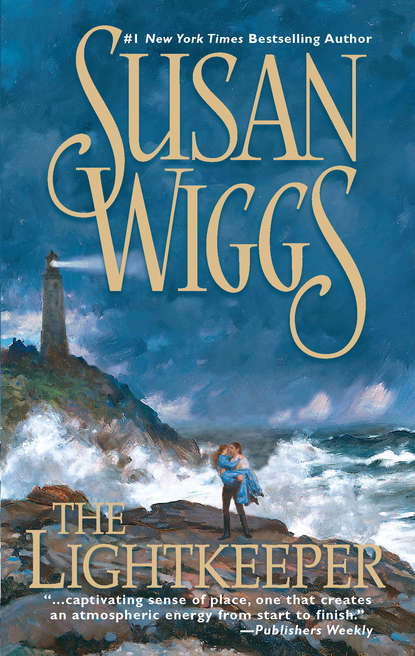
Полная версия
The Ocean Between Us

Praise for the novels of
SUSAN WIGGS
“A human and multilayered story exploring duty to both country and family.”
—Nora Roberts on The Ocean Between Us
“Susan Wiggs tackles contemporary issues in the crucible of family with gutsy poignancy and adroit touches of whimsy that make for an irresistible read.”
—BookPage on Home Before Dark
“The story’s theme—the all-encompassing power of love—is timeless, and it is this theme, along with the author’s polished prose and well-rounded characters, that makes Wiggs’s story so satisfying.”
—Publishers Weekly starred review on A Summer Affair
“A thrilling blend of adventure and romance…Wiggs provides a delicious story for us to savor.”
—Oakland Press on The Mistress
“Wiggs tackles some very difficult family issues in this tightly woven tale. Cleverly uncovering secrets at the perfect pace, she draws you into the tale with each passing page, allowing her characters’ emotions and motivations to flow out of the book and into your heart.”
—Romantic Times on Home Before Dark
“Engaging characters, nail-biting suspense, and a heartwarming secondary plot of a forbidden teenage love combine to make a delectable tale of Victorian America.”
—Booklist starred review on A Summer Affair
“It’s an inspiring story that will touch your heart.”
—Oakland Press on The Horsemaster’s Daughter
“A bold, humorous and poignant romance that fulfills every woman’s dreams.”
—New York Times bestselling author Christina Dodd on The Mistress
“With its lively prose, well-developed conflict and passionate characters, this enjoyable, poignant tale is certain to enchant.”
—Publishers Weekly starred review on Halfway to Heaven
“…captivating sense of place, one that creates an atmospheric energy from start to finish.”
—Publishers Weekly on The Lightkeeper
“A woman’s valiant struggle for life and love, by turns romantic and gritty, always compelling.”
—New York Times bestselling author Josie Litton on Enchanted Afternoon
“Home Before Dark is a beautiful novel, tender and wise. Susan Wiggs writes with bright assurance, humor and compassion about sisters, children and the sweet and heartbreaking trials of life—about how much better it is to go through them together.”
—New York Times bestselling author Luanne Rice
“People you’ll care about living real lives in one of the world’s most romantic cities. What more could a romance lover ask for?”
—Salem Statesman-Journal on A Summer Affair
“Wiggs’ strongest and most vivid writing, a novel that bites into such loaded issues as adoption, estranged sisters, difficult teens…family secrets…”
—Seattle Times on Home Before Dark
“Wiggs’s synergistic blending of historical authenticity, complex multifaceted characters, and riveting plot makes for an exquisite romance.”
—Booklist on The Firebrand
“The action-adventure edition of the romance novel.”
—Detroit Free Press on The Mistress
“Wiggs has a knack for creating engaging characters, and her energetic prose shines through the pages.”
—Publishers Weekly on Enchanted Afternoon
“Wiggs combines the complications of love and politics in an entertaining American historical.”
—Booklist on Halfway to Heaven
“With this final installment of Wiggs’s Chicago Fire trilogy, she has created a quiet page-turner that will hold readers spellbound.”
—Publishers Weekly on The Firebrand
“The Charm School draws readers in with delightful characters, engaging dialogue, humor, emotion and sizzling sensuality.”
—Costa Mesa Sunday Times
“A smart, unorthodox coupling to which Wiggs adds humor, brains and a certain cultivation that will leave readers anticipating her next romance.”
—Publishers Weekly on The Drifter
“An irresistible blend of The Ugly Duckling and My Fair Lady. Jump right in and enjoy yourself—I did.”
—New York Times bestselling author Catherine Coulter
“Wiggs’ writing shimmers…. Her flair for crafting intelligent characters and the sheer joy of the verbal sparring between them makes for a delightful story you’ll want to devour at once.”
—BookPage on Halfway to Heaven
“A classic beauty-and-the-beast love story that will stay in your heart long after you’ve turned the last page. A poignant, beautiful romance.”
—New York Times bestselling author Kristin Hannah on The Lightkeeper
“In poetic prose, Wiggs evocatively captures the Old South and creates an intense, believable relationship between the lovers.”
—Publishers Weekly on The Horsemaster’s Daughter
Also by SUSAN WIGGS
SUMMER BY THE SEA
A SUMMER AFFAIR
HOME BEFORE DARK
ENCHANTED AFTERNOON
PASSING THROUGH PARADISE
HALFWAY TO HEAVEN
THE YOU I NEVER KNEW
The Chicago Fire Trilogy
THE FIREBRAND
THE MISTRESS
THE HOSTAGE
THE HORSEMASTER’S DAUGHTER
THE CHARM SCHOOL
THE DRIFTER
THE LIGHTKEEPER
And watch for
TABLE FOR FIVE
The Ocean Between Us
Susan Wiggs

To my friend Geri Krotow and her family,
with love and deepest respect.
CONTENTS
PART 1:Mishap
CHAPTER 1
CHAPTER 2
CHAPTER 3
CHAPTER 4
PART 2:Point of Embarkation
CHAPTER 5
CHAPTER 6
CHAPTER 7
CHAPTER 8
CHAPTER 9
CHAPTER 10
CHAPTER 11
CHAPTER 12
CHAPTER 13
CHAPTER 14
CHAPTER 15
CHAPTER 16
PART 3:Communications Blackout
CHAPTER 17
CHAPTER 18
CHAPTER 19
CHAPTER 20
CHAPTER 21
CHAPTER 22
CHAPTER 23
CHAPTER 24
CHAPTER 25
CHAPTER 26
CHAPTER 27
CHAPTER 28
CHAPTER 29
CHAPTER 30
CHAPTER 31
CHAPTER 32
CHAPTER 33
CHAPTER 34
PART 4:Duty Status—Whereabouts Unknown
CHAPTER 35
CHAPTER 36
CHAPTER 37
CHAPTER 38
CHAPTER 39
CHAPTER 40
CHAPTER 41
CHAPTER 42
CHAPTER 43
CHAPTER 44
CHAPTER 45
PART 5:Active Homing
CHAPTER 46
CHAPTER 47
CHAPTER 48
CHAPTER 49
CHAPTER 50
CHAPTER 51
PART 1
Mishap
Mishap: Unplanned or unexpected event causing personal injury, occupational illness, death, material loss or damage, or an explosion of any kind whether damage occurs or not.
(NAVAL AVIATION SAFETY PROGRAM)
CHAPTER 1
USS Dominion (CVN-84)
0037N 17820W
Speed 33
2215 hours (Time Zone YANKEE)
Steve Bennett glanced at the clock on his computer screen. He ought to be in his rack and sleeping soundly. Instead, he sat with his feet propped on the edge of the workstation, hands clasped behind his head while he stared at a scenic Washington State calendar and thought about Grace.
He was ten thousand miles from home, on an aircraft carrier in the middle of an unofficial communications blackout instigated by Grace herself. His wife. The mother of his children. The woman who had not spoken to him willingly since he’d been deployed.
She had maintained radio silence like a wartime spy. He received official communiqués about the children, and sometimes the occasional report that made him regret giving her power of attorney. But never more than that.
The cruise was nearly over, and for the first time in his career Steve felt apprehensive about going home. He had no idea whether or not they could put their marriage back together again.
“Captain Bennett?” An administrative officer stood in the doorway with a clipboard in one hand and a PDA in the other.
“What is it, Lieutenant Killigrew?”
“Ms. Francine Atwater is here to see you, sir.”
Bennett hid a frown. He’d nearly forgotten their appointment. In the belly of a carrier there was no day or night, just an unrelenting fluorescent sameness, stale recycled air and the constant thunder of flight ops rattling through the steel bones of the ship.
“Send her in.” He unfolded his long frame and stood, assuming the stiff and wary posture schooled into him by twenty-six years in the Navy. Killigrew left for a moment, then returned with the reporter. Steve would have preferred to use the public affairs office on the 01 deck, but apparently Ms. Atwater was adamant about exploring every facet of carrier life. It was, after all, the era of the embedded reporter.
Francine Atwater. Francine. A member of the “new media,” eager to take advantage of the military’s newly relaxed information policy. According to his briefing notes, she had arrived COD—carrier onboard delivery—and intended to spend the next two weeks in this floating city with its own airport. Both the skipper of the Dominion and Captain Mason Crowther, Commander of the Air Group, had welcomed her personally, but they’d quickly handed her off to others, and now it was Steve’s turn.
“Ms. Atwater, I’m Captain Steve Bennett, Deputy Commander of the Air Group.” He tried not to stare, but she was the first civilian woman he’d seen in months. In a skirt, no less. He silently paid tribute to the genius who had invented nylon stockings and cherry-colored lipstick.
“Thank you, Captain Bennett.” Her glossy lips parted in a smile. She was a charmer, all right, the way she tilted her head to one side and looked up at him through long eyelashes. Still, he detected shadows of fatigue under her carefully made-up eyes. Newcomers to the carrier usually suffered seasickness and insomnia from all the noise.
“Welcome aboard, ma’am.”
“I see you’ve been briefed about me,” she said, indicating his notes from the PAO.
“Yes, ma’am.”
“What a surprise. Everyone on this ship has. I swear, the U.S. Navy knows more about me than my own mother. My blood type, shoe size, visual acuity, sophomore-year biology grade—”
“Standard procedure, ma’am.” Even in lipstick and nylon stockings, the media held no appeal to the military. Still, he respected the way she stood her ground, especially while wearing three-inch heels. Civilians were advised on practical shipboard attire, but apparently no one had wanted Francine to change her shoes.
A tremendous whoosh, followed by a loud thump, rocked the ship. She staggered a little, and he put out a hand to steady her.
“Tell me I’ll get used to that,” she said.
“You’d better. We’re launching and recovering planes around the clock, day and night. It’s not going to stop.” He slid open a desk drawer and took out a sealed plastic package. “Take these. I always keep plenty on hand.”
“Earplugs?” She slipped the package into her briefcase. “Thanks.”
He motioned her to a chair and she sat down, setting aside her bag. She took out a palm-size digital recorder, then swept the small space with a glance that shifted like a radar, homing in on the few personal items in evidence. “You have a beautiful family.”
“Thank you, ma’am. I think so.”
“How old are your children?”
“Brian and Emma are twins. They’re seniors this year. Katie’s in ninth grade. And that’s Grace, my wife.” A world of pain and hope underlay his words, but he prayed the reporter wouldn’t notice. Every day he looked at that picture and tried to figure out what would fix this. He’d never deceived his wife before, so he didn’t know how to undo the damage he’d caused. An ordinary husband would go home, take her out to dinner and say, “Look, honey. The truth is…” But Bennett couldn’t do that from the middle of the ocean.
And sometimes he wondered if he even wanted to, damn it. He’d done his best to keep her from being hurt, but she didn’t seem to appreciate that.
In the photo, taken at Mustang Island when they were stationed in Corpus Christi, the four of them were laughing into the camera, sunburned faces glowing.
“This is a great shot,” said Ms. Atwater. “They look like the kind of people nothing bad ever happens to.”
Interesting observation. He would have agreed with her, right up until this deployment. Grace and the kids were part of the all-American family, the kind you saw on minivan commercials or at summer baseball games.
“What’s it like, being away from them for months on end?”
What the hell did she think it was like? A damned fraternity party?
“It’s rough. I’m sure you’ll hear that from a lot of the sailors on board. It’s hard seeing your baby’s first steps on videotape or getting a picture of a winning soccer goal by e-mail.” Steve wished he had prepared himself better for her nosiness. He should have barricaded his private self. He was supposed to be good at that. According to Grace, he was the champ.
Atwater studied another photograph, this one in a slightly warped frame nearly twenty years old. “But the homecomings are sweet,” she murmured, gazing down at the fading image.
He couldn’t recall who had taken that shot, but he remembered the moment with painful clarity. It was the end of his first cruise after they’d married. The gray steel hull of an aircraft carrier reared in the background. Sailors, officers and civilians all crushed together, hugging with the desperate joy only military families understood. At the center, he and Grace held each other in an embrace he could still feel all these years later. He clasped her so close that her feet came off the ground, one of her dainty high heels dangling off a slender foot. He could still remember what she smelled like.
Since that photo was taken there had been dozens of other partings and reunions. He could picture each homecoming in succession—Grace pregnant with the twins, no high heels that time, just sneakers that wouldn’t lace up around her swollen feet. Then Grace pushing a double stroller that wouldn’t fit through doorways. By then, her perfume was more likely to be a blend of baby wipes and cough drops. In later years, the kids kept her busy as she shuffled them between music lessons, sports practices, Brownies and Boy Scouts. But she always came to meet him. She never left him standing like some loser whose wife had given him the shaft while he was at sea, who would sling his seabag over his shoulder and pretend it didn’t matter, whistling under his breath as he headed straight for the nearest bar.
Yesterday had been Grace’s fortieth birthday. He’d phoned and gotten the machine. Lately she was so prickly about her age, anyway. She probably wouldn’t thank him for the reminder.
Atwater asked about his background, his career path in the Navy, his role on the carrier. She listened well, occasionally making notes on a small yellow pad as well as recording him. At one point he glanced at his watch and was surprised to see how much time had passed. She’d talked to him about his family for nearly an hour. He wondered if he’d told her too much. Did the American people really need to know his life was coming undone like a slipknot?
He cleared his throat. “Says on my agenda that I’m your tour guide for nighttime flight ops.” He was surprised that she’d gained authorization to be on the flight deck at night, but apparently her project was important to Higher Authority.
“I’ve been looking forward to this, sir.” She came alive in that special way of people who were in love with flying, the more high-tech and dangerous, the better. And there was no form of flying more dangerous than carrier operations.
He was dog tired, but he put on a smile because, in spite of everything, he shared her enthusiasm.
“I thought about going into the service and learning to fly,” she said, her eyes shining. “Couldn’t make the commitment, though.”
“Lots of people can’t.” He said it without condemnation or pride. It was a plain fact. The U.S. Navy demanded half of your life. It was as simple as that. He’d been in the Navy since his eighteenth birthday. And of his twenty-six years of service, he’d been at sea for half of them. That kind of commitment had its rewards, but it also carried a price. He was finally figuring that out.
As he went to the door, the Inbox on his computer screen blinked, but he didn’t check to see what had come in. If it was personal, he didn’t want a reporter reading over his shoulder.
He led her single file down a narrow passageway tiled in blue, narrating their journey and cautioning her to avoid slamming her shins on the “knee knockers,” structural members at the bottom of each hatch. Lining the P-way were dozens of red cabinets containing fire-control gear and protective clothing. The least little spark could take out half the ship if it happened to ignite in the wrong place.
Steve spoke over his shoulder, but he wasn’t sure how much she was taking in. The constant din of flight ops intruded—roaring engines, the hiss and grind of the power plant and arresting gear, the whistle and screech of aircraft slamming on deck—drowning out normal conversation. In the enlisted men’s mess, they created a small stir. Sailors enjoying MIDRATS—rations for personnel on night duty—stopped what they were doing the minute they saw Francine Atwater. Their jaws dropped as though unhinged. Even the female sailors stared, not with the raw yearning of the males but with wistfulness, and perhaps a flicker of disdain. In the service of their country, they had learned to do without makeup, without hair spray, without vanity.
As they climbed an open steel ladder, Atwater took it in stride, but she was probably wishing she’d worn pants and thick-soled boots. They crossed the hangar bay, where aircraft waited with wings folded like origami cranes.
In the passageway under flight-deck control, the roar of aircraft pounding the steel deck was louder still. “We need to gear up,” Steve said, handing her a flight suit and boots.
“I’ve been briefed on safety procedures.” She sat down and slipped off her civilian shoes, flashing a slim foot encased in a nylon stocking. “Hours and hours of briefing.”
“The Navy loves to brief people,” he admitted, hearing echoes of the endless droning of Navy gouge he’d endured over the years, litanies of instruction and advisories. “In this case, I hope you listened,” he added. Then, assuming she hadn’t, he reiterated the list of hazards on the flight deck. A sailor could be sucked into an engine intake. Exhaust from a jet engine had the power to blast a person across the deck, or even overboard. He’d seen large men bouncing like basketballs all the way to the deck edge. Or an arresting wire might snap as a tail hook grabbed it, whipping with enough force to sever a person’s legs. Taxiing planes, scurrying yellow tractors, breaking launch bars—all were hazards waiting to happen.
His hand wandered to his throat in a habitual gesture, seeking his St. Christopher medal. Then he remembered that he’d lost it, the good-luck charm he’d had since his first deployment. He never went to sea without it. Ah, hell. At least he wasn’t flying.
He distracted himself by perusing the bulletin board of one of the squadrons. The postings included items for sale or trade, a movie schedule and an invitation to the upcoming Steel Beach picnic, during which a dozen or so garage bands would perform. Personnel on board were desperate to create a normal existence in a highly abnormal situation.
It didn’t always work, Steve thought.
After she finished gearing up for flight ops, Francine Atwater looked totally different. Steel-toed boots, a shiny gray-green jumpsuit and a white visitor’s jersey hid all of her charms except those big brown eyes.
Feeling a bit like an airline flight attendant, he showed her how to operate her float coat. The vest was equipped with a beacon light, a packet of chemical dye to mark the water if she found herself in the drink, a flare, a whistle. “This is your MOBI,” he said. It was a transmitter the size of a cell phone, with a whip antenna connected to a small box.
“Let me guess. Man Overboard…Indicator.”
“You did your homework.”
“I told you, I was briefed. But you’re forgetting something,” she said.
“What’s that?”
“I don’t intend to go for a midnight swim.”
“Then we’re on the same page.” He slipped the device into the dye pouch of her float coat and closed the Velcro fastening. “But just in case, the transmitter has its own unique identification. That way, the bridge will know identity and location immediately.”
“So this one has my name on it?”
“Just the number of the float coat. You want me to show you how to fasten everything?”
“I’ve got it,” she said.
He showed her a status board outlining the night’s exercises. The list indicated who was taking off, who was landing, who the crew members were, the purpose of their particular operation.
“Two of the names are in red,” Atwater pointed out. “Is that significant?”
“They’re nugget pilots. New guys. This is their first cruise.”
“Lieutenant junior grade Joshua Lamont,” she read from the chart. “Call sign Lamb.”
Steve didn’t move a muscle, even though the sound of Lamont’s name was a punch in the gut. He wondered if he would ever get used to having Lamont under his command. A C-2 Greyhound transport plane had flown the young pilot aboard as a replacement pilot. Lamont was a member of the Sparhawks, the carrier’s squadron of EA-6B Prowlers. The reporter probably thought his call sign was sweet, but Steve knew it came from an incident during training in Nevada—Little Angry Man Boy.
“He’s flying Prowler six-two-three,” she observed. “My cameramen videotaped the aircrew while they were preparing that plane for tonight’s flight.”
“You’re making a video?” The public affairs office hadn’t bothered to tell him exactly what was up.
“You bet.”
He shouldn’t be surprised. A magazine was no longer just a magazine. These days every publication needed a multimedia presence on the Web, with all the attendant bells and whistles. Higher Authority had given their blessing to the article. These were patriotic times and frankly—unexpectedly—the media had been good to the military in recent times. Strange bedfellows, but sometimes you never knew.
“Lamont’s been in the air one hour and forty-eight minutes now,” he said. “Looks like they’ll be landing soon.”
“What about the other name in red—Sean Corn?”
“Lieutenant Corn is due to land directly behind the Prowler. He’s driving one of the Tomcats.”
“And they’re new to night carrier landings?”
“Yes, ma’am, but they’ve had extensive training.” Steve quickly switched to the public-affairs spiel. “A carrier landing is basically a crash landing on an area about four hundred feet long. The margin of error on approach is less than eighteen inches,” he told her. “The tail hook has to grab an arresting wire, or you have a bolter and the pilot has to come around for another pass. Success depends on every member of the team doing his job right, doing it on time and following orders. So the question isn’t why so many accidents happen but why so few.”
“But accidents do happen.”
He wondered if she had a secret wish to witness one. “Yes, ma’am.”
“Do you fly often, Captain Bennett?”
“Enough to stay qualified.”
“Do you miss it?”
“Flying used to be my life, but after almost a thousand carrier traps, I can live without it.” He tried not to smile at her thunderstruck expression. “Look, ma’am, if you’re looking for drama, you’re talking to the wrong guy.”











